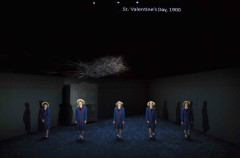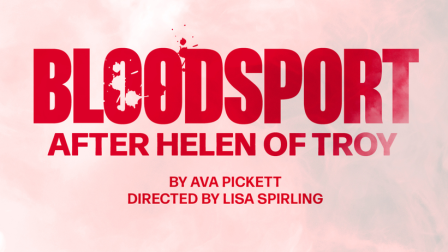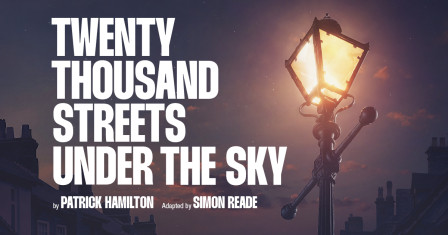Review: PICNIC AT HANGING ROCK at the Barbican
 Written as a novel in 1967 by Joan Lindsey, the story of Picnic At Hanging Rock has for decades caused discussion as to whether the story is based on fact or not. The book's publishers enticed readers with the statement, 'an intriguing mystery which may be interpreted as fact or fiction'.
Written as a novel in 1967 by Joan Lindsey, the story of Picnic At Hanging Rock has for decades caused discussion as to whether the story is based on fact or not. The book's publishers enticed readers with the statement, 'an intriguing mystery which may be interpreted as fact or fiction'.
Nearly a decade after publication, Peter Weir directed the film version, a sumptuous visual feast set against the vast Australian landscape. Billowing muslin dresses and languid shots of Victorian girls out on their picnic drew one into the mystery of the three schoolgirls and their teacher, all of whom disappeared at Hanging Rock on Valentine's Day in 1900.
The stage production by Malthouse Theatre and Black Swan State Theatre opens with five girls in crisp school uniform and straw boaters, standing in a line within a stark grey box set. They describe in a series of beautifully detailed monologues the events of that fateful day. There is no visual attempt here at trying to transport the audience into that Australian landscape, other than a curious nest of brushwood hanging over the stage - maybe as an ominous presence of what is to become of the girls. The audience is left to conjure the images in their own imagination thanks to the descriptive text. However the clever use of sound by J. David Franzke provides atmosphere. The almost deafening lack of sound, thanks to a carpeted stage, and the darkest of blackouts ensure the rapid scene changes are as sharp and unsettling as the story itself.
The play has been adapted from the novel by Tom Wright and the five actresses switch effortlessly between playing multiple characters, such as schoolgirls, teachers and English gentlemen. The five women are listed in the programme as 'cast' - as an ensemble piece this is a deliberate choice, however Elizabeth Nabben's brittle portrayal of Mrs Appleyard deserves a mention.
As the story after their disappearance unfolds, the third person narrative changes to dramatic dialogue and tension builds between the remaining sexually repressed school girls and their Victorian headmistress, leading to hysteria when one of the girls is found and brought back to the school. Questions are asked but she is apparently unable to remember anything of what happened. At a running time of ninety minutes without an interval, Picnic At Hanging Rock ends abruptly, the audience left questioning what indeed happened on that fateful day.
The performances by the all-female cast are faultless; the direction by Matthew Lutton is sharp and bold on the stark stage. However, despite its poetic language, the play leaves me somewhat cold. Despite one jump scare, the mystery is never quite eerie enough, and I do not care about the fate of any of the girls. This could be due to not really ever getting to know and invest in them as people, or possibly due to the highly stylised version of the play.
Latest News

 Review: UKRAINE UNBROKEN at Arcola Theatre
3 March 2026 at 16:18
Review: UKRAINE UNBROKEN at Arcola Theatre
3 March 2026 at 16:18

 New Cast Announced For MAGIC MIKE LIVE
3 March 2026 at 15:09
New Cast Announced For MAGIC MIKE LIVE
3 March 2026 at 15:09

 World premiere of 'BLOODSPORT: AFTER HELEN OF TROY' at Stratford East announced
3 March 2026 at 12:00
World premiere of 'BLOODSPORT: AFTER HELEN OF TROY' at Stratford East announced
3 March 2026 at 12:00

 Troupe Announces World Premiere of TWENTY THOUSAND STREETS UNDER THE SKY
3 March 2026 at 11:28
Troupe Announces World Premiere of TWENTY THOUSAND STREETS UNDER THE SKY
3 March 2026 at 11:28
